History of the Church: Evangelicals and Slavery Abolition
VerifiedAdded on 2021/01/02
|8
|2530
|394
Essay
AI Summary
This essay delves into the historical contributions of evangelicals to the abolition of slavery in the UK during the 17th and 18th centuries. It examines the core beliefs of evangelicals, emphasizing their strong faith in the Bible, personal conversion experiences, and the importance of serving mankind to achieve salvation. The essay analyzes the context of slavery, its prevalence, and the moral and religious arguments against it. It highlights the emergence of the anti-slavery movement, particularly the role of key figures like John Woolman, William Wilberforce, and Thomas Clarkson, and their efforts to influence public opinion, Parliament, and the eventual abolition of the slave trade and slavery itself. The essay concludes by emphasizing the significant impact of evangelicals in shaping the course of history and their commitment to social justice.

THE HISTORY OF THE CHURCH
Paraphrase This Document
Need a fresh take? Get an instant paraphrase of this document with our AI Paraphraser
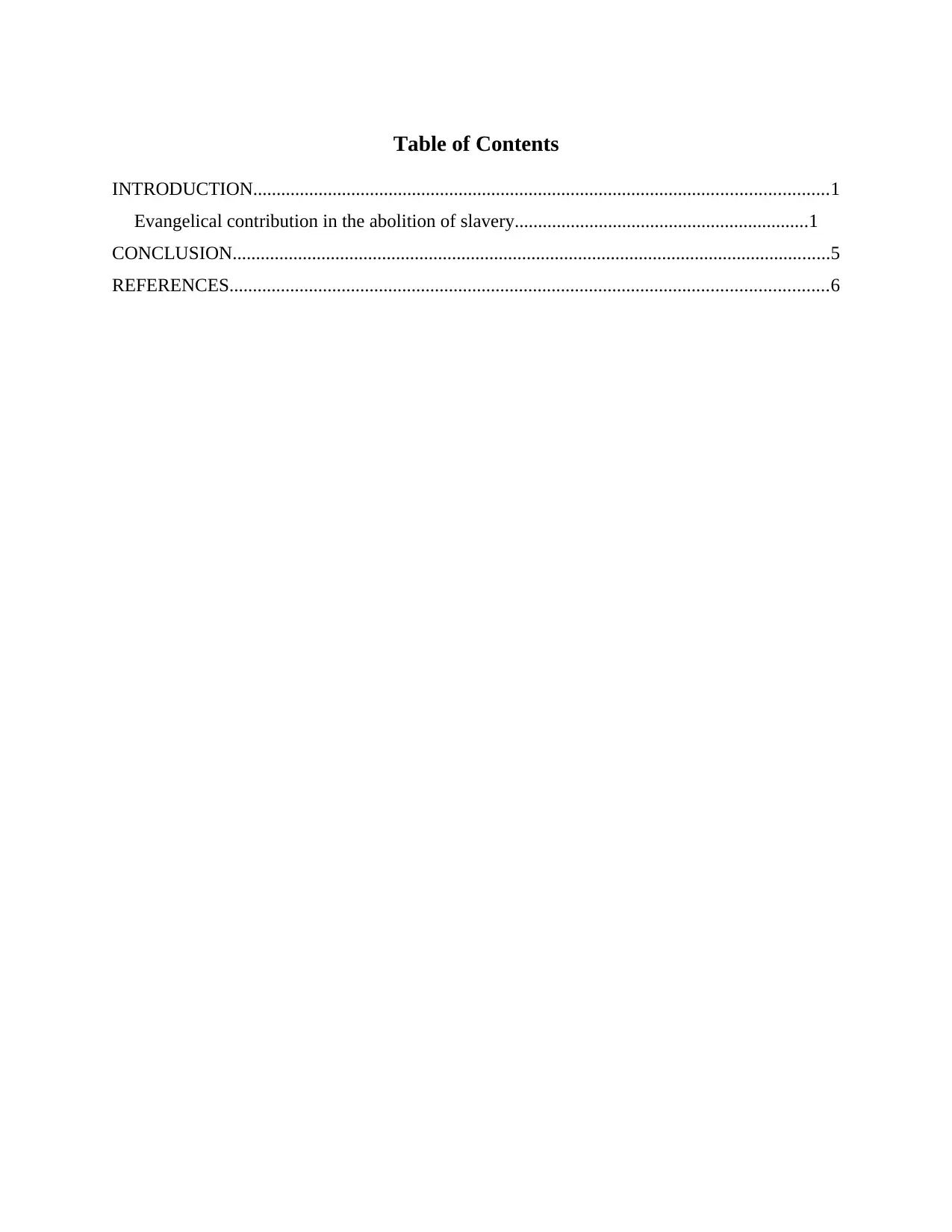
Table of Contents
INTRODUCTION...........................................................................................................................1
Evangelical contribution in the abolition of slavery...............................................................1
CONCLUSION................................................................................................................................5
REFERENCES................................................................................................................................6
INTRODUCTION...........................................................................................................................1
Evangelical contribution in the abolition of slavery...............................................................1
CONCLUSION................................................................................................................................5
REFERENCES................................................................................................................................6
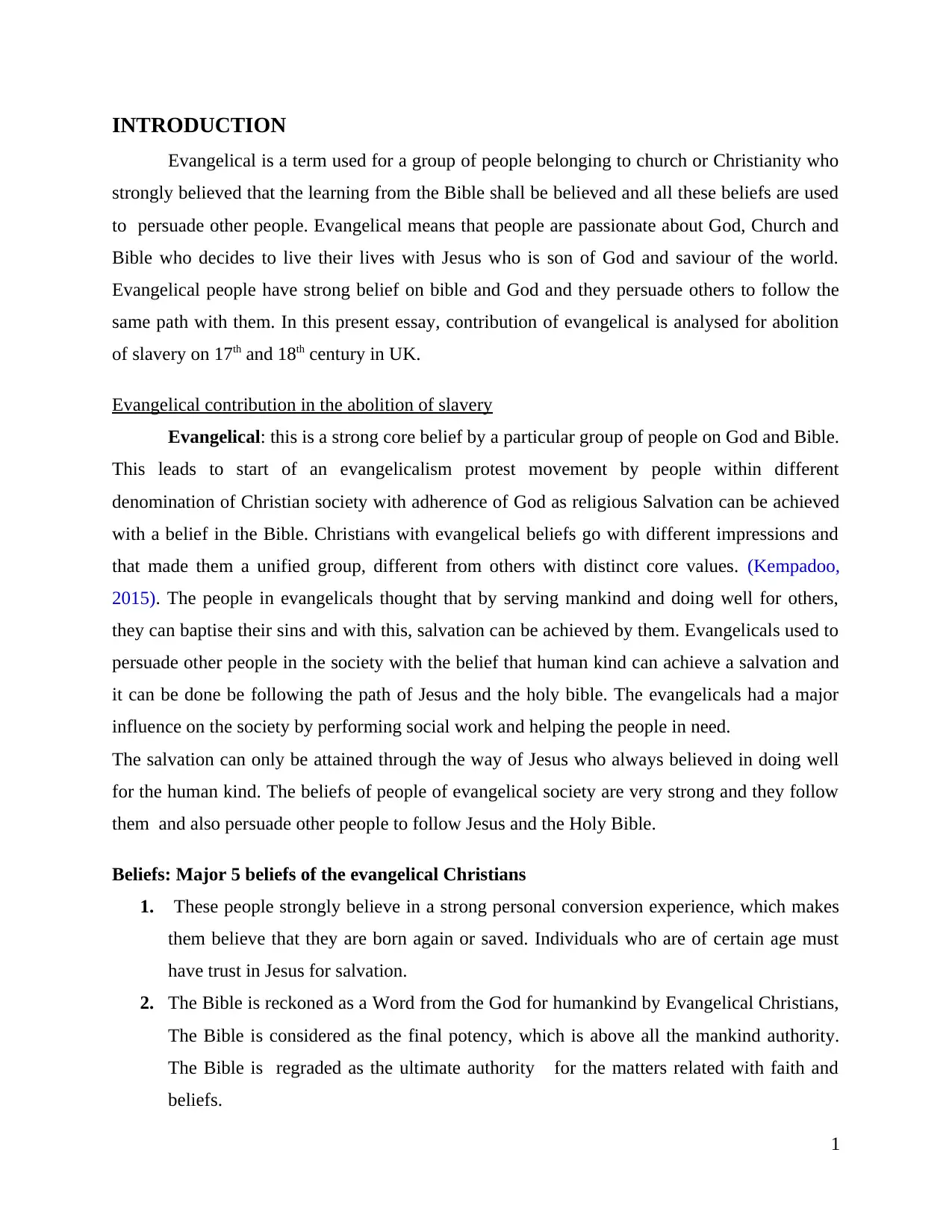
INTRODUCTION
Evangelical is a term used for a group of people belonging to church or Christianity who
strongly believed that the learning from the Bible shall be believed and all these beliefs are used
to persuade other people. Evangelical means that people are passionate about God, Church and
Bible who decides to live their lives with Jesus who is son of God and saviour of the world.
Evangelical people have strong belief on bible and God and they persuade others to follow the
same path with them. In this present essay, contribution of evangelical is analysed for abolition
of slavery on 17th and 18th century in UK.
Evangelical contribution in the abolition of slavery
Evangelical: this is a strong core belief by a particular group of people on God and Bible.
This leads to start of an evangelicalism protest movement by people within different
denomination of Christian society with adherence of God as religious Salvation can be achieved
with a belief in the Bible. Christians with evangelical beliefs go with different impressions and
that made them a unified group, different from others with distinct core values. (Kempadoo,
2015). The people in evangelicals thought that by serving mankind and doing well for others,
they can baptise their sins and with this, salvation can be achieved by them. Evangelicals used to
persuade other people in the society with the belief that human kind can achieve a salvation and
it can be done be following the path of Jesus and the holy bible. The evangelicals had a major
influence on the society by performing social work and helping the people in need.
The salvation can only be attained through the way of Jesus who always believed in doing well
for the human kind. The beliefs of people of evangelical society are very strong and they follow
them and also persuade other people to follow Jesus and the Holy Bible.
Beliefs: Major 5 beliefs of the evangelical Christians
1. These people strongly believe in a strong personal conversion experience, which makes
them believe that they are born again or saved. Individuals who are of certain age must
have trust in Jesus for salvation.
2. The Bible is reckoned as a Word from the God for humankind by Evangelical Christians,
The Bible is considered as the final potency, which is above all the mankind authority.
The Bible is regraded as the ultimate authority for the matters related with faith and
beliefs.
1
Evangelical is a term used for a group of people belonging to church or Christianity who
strongly believed that the learning from the Bible shall be believed and all these beliefs are used
to persuade other people. Evangelical means that people are passionate about God, Church and
Bible who decides to live their lives with Jesus who is son of God and saviour of the world.
Evangelical people have strong belief on bible and God and they persuade others to follow the
same path with them. In this present essay, contribution of evangelical is analysed for abolition
of slavery on 17th and 18th century in UK.
Evangelical contribution in the abolition of slavery
Evangelical: this is a strong core belief by a particular group of people on God and Bible.
This leads to start of an evangelicalism protest movement by people within different
denomination of Christian society with adherence of God as religious Salvation can be achieved
with a belief in the Bible. Christians with evangelical beliefs go with different impressions and
that made them a unified group, different from others with distinct core values. (Kempadoo,
2015). The people in evangelicals thought that by serving mankind and doing well for others,
they can baptise their sins and with this, salvation can be achieved by them. Evangelicals used to
persuade other people in the society with the belief that human kind can achieve a salvation and
it can be done be following the path of Jesus and the holy bible. The evangelicals had a major
influence on the society by performing social work and helping the people in need.
The salvation can only be attained through the way of Jesus who always believed in doing well
for the human kind. The beliefs of people of evangelical society are very strong and they follow
them and also persuade other people to follow Jesus and the Holy Bible.
Beliefs: Major 5 beliefs of the evangelical Christians
1. These people strongly believe in a strong personal conversion experience, which makes
them believe that they are born again or saved. Individuals who are of certain age must
have trust in Jesus for salvation.
2. The Bible is reckoned as a Word from the God for humankind by Evangelical Christians,
The Bible is considered as the final potency, which is above all the mankind authority.
The Bible is regraded as the ultimate authority for the matters related with faith and
beliefs.
1
⊘ This is a preview!⊘
Do you want full access?
Subscribe today to unlock all pages.

Trusted by 1+ million students worldwide
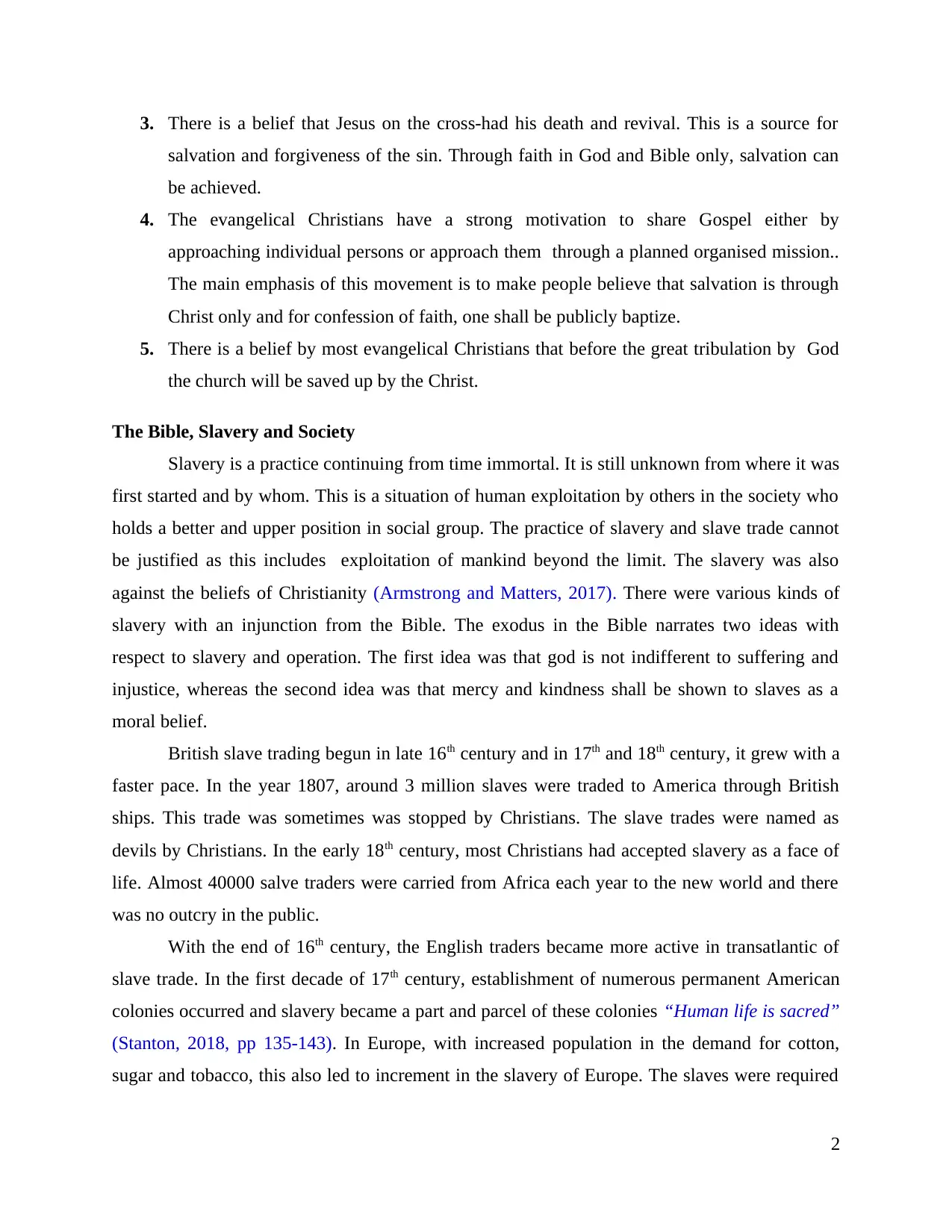
3. There is a belief that Jesus on the cross-had his death and revival. This is a source for
salvation and forgiveness of the sin. Through faith in God and Bible only, salvation can
be achieved.
4. The evangelical Christians have a strong motivation to share Gospel either by
approaching individual persons or approach them through a planned organised mission..
The main emphasis of this movement is to make people believe that salvation is through
Christ only and for confession of faith, one shall be publicly baptize.
5. There is a belief by most evangelical Christians that before the great tribulation by God
the church will be saved up by the Christ.
The Bible, Slavery and Society
Slavery is a practice continuing from time immortal. It is still unknown from where it was
first started and by whom. This is a situation of human exploitation by others in the society who
holds a better and upper position in social group. The practice of slavery and slave trade cannot
be justified as this includes exploitation of mankind beyond the limit. The slavery was also
against the beliefs of Christianity (Armstrong and Matters, 2017). There were various kinds of
slavery with an injunction from the Bible. The exodus in the Bible narrates two ideas with
respect to slavery and operation. The first idea was that god is not indifferent to suffering and
injustice, whereas the second idea was that mercy and kindness shall be shown to slaves as a
moral belief.
British slave trading begun in late 16th century and in 17th and 18th century, it grew with a
faster pace. In the year 1807, around 3 million slaves were traded to America through British
ships. This trade was sometimes was stopped by Christians. The slave trades were named as
devils by Christians. In the early 18th century, most Christians had accepted slavery as a face of
life. Almost 40000 salve traders were carried from Africa each year to the new world and there
was no outcry in the public.
With the end of 16th century, the English traders became more active in transatlantic of
slave trade. In the first decade of 17th century, establishment of numerous permanent American
colonies occurred and slavery became a part and parcel of these colonies “Human life is sacred”
(Stanton, 2018, pp 135-143). In Europe, with increased population in the demand for cotton,
sugar and tobacco, this also led to increment in the slavery of Europe. The slaves were required
2
salvation and forgiveness of the sin. Through faith in God and Bible only, salvation can
be achieved.
4. The evangelical Christians have a strong motivation to share Gospel either by
approaching individual persons or approach them through a planned organised mission..
The main emphasis of this movement is to make people believe that salvation is through
Christ only and for confession of faith, one shall be publicly baptize.
5. There is a belief by most evangelical Christians that before the great tribulation by God
the church will be saved up by the Christ.
The Bible, Slavery and Society
Slavery is a practice continuing from time immortal. It is still unknown from where it was
first started and by whom. This is a situation of human exploitation by others in the society who
holds a better and upper position in social group. The practice of slavery and slave trade cannot
be justified as this includes exploitation of mankind beyond the limit. The slavery was also
against the beliefs of Christianity (Armstrong and Matters, 2017). There were various kinds of
slavery with an injunction from the Bible. The exodus in the Bible narrates two ideas with
respect to slavery and operation. The first idea was that god is not indifferent to suffering and
injustice, whereas the second idea was that mercy and kindness shall be shown to slaves as a
moral belief.
British slave trading begun in late 16th century and in 17th and 18th century, it grew with a
faster pace. In the year 1807, around 3 million slaves were traded to America through British
ships. This trade was sometimes was stopped by Christians. The slave trades were named as
devils by Christians. In the early 18th century, most Christians had accepted slavery as a face of
life. Almost 40000 salve traders were carried from Africa each year to the new world and there
was no outcry in the public.
With the end of 16th century, the English traders became more active in transatlantic of
slave trade. In the first decade of 17th century, establishment of numerous permanent American
colonies occurred and slavery became a part and parcel of these colonies “Human life is sacred”
(Stanton, 2018, pp 135-143). In Europe, with increased population in the demand for cotton,
sugar and tobacco, this also led to increment in the slavery of Europe. The slaves were required
2
Paraphrase This Document
Need a fresh take? Get an instant paraphrase of this document with our AI Paraphraser
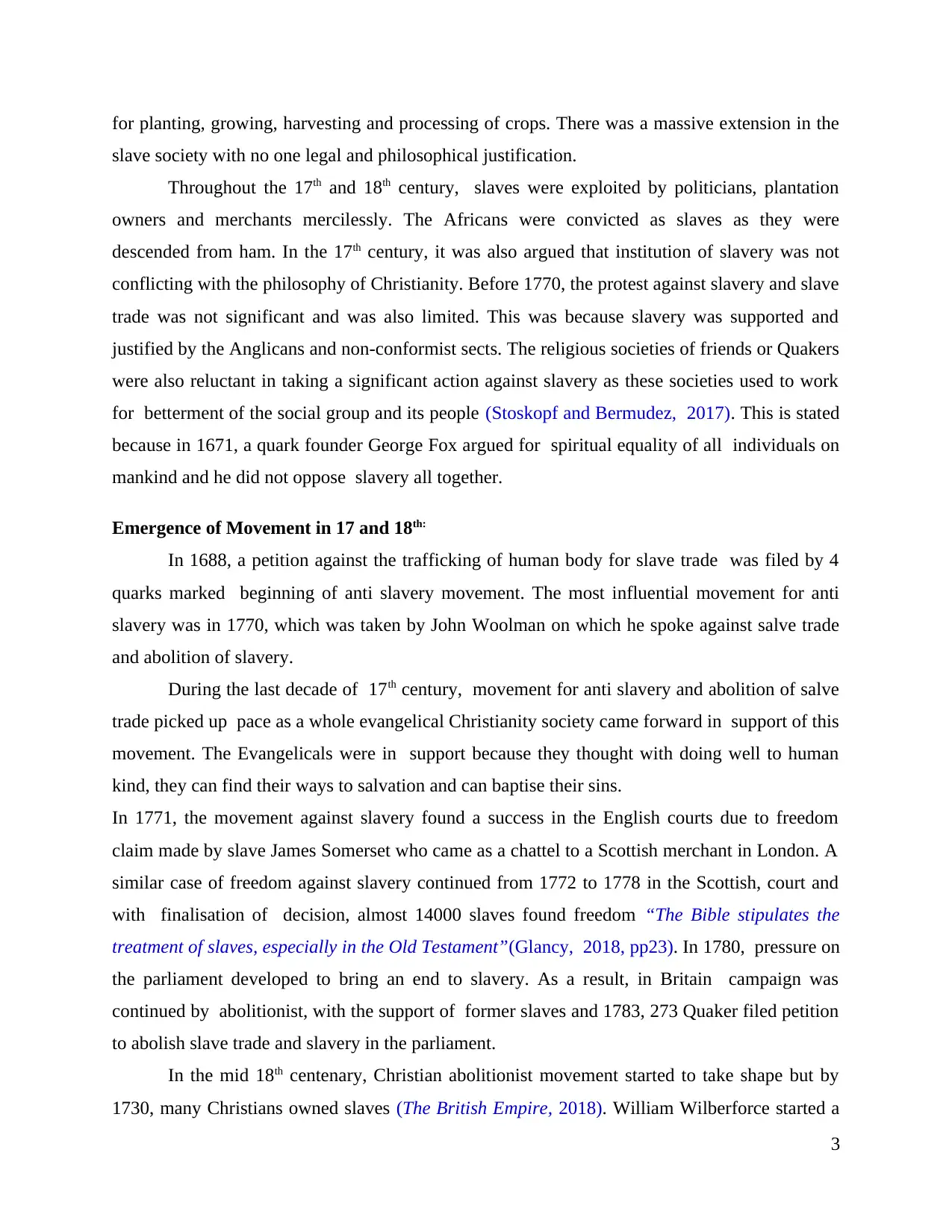
for planting, growing, harvesting and processing of crops. There was a massive extension in the
slave society with no one legal and philosophical justification.
Throughout the 17th and 18th century, slaves were exploited by politicians, plantation
owners and merchants mercilessly. The Africans were convicted as slaves as they were
descended from ham. In the 17th century, it was also argued that institution of slavery was not
conflicting with the philosophy of Christianity. Before 1770, the protest against slavery and slave
trade was not significant and was also limited. This was because slavery was supported and
justified by the Anglicans and non-conformist sects. The religious societies of friends or Quakers
were also reluctant in taking a significant action against slavery as these societies used to work
for betterment of the social group and its people (Stoskopf and Bermudez, 2017). This is stated
because in 1671, a quark founder George Fox argued for spiritual equality of all individuals on
mankind and he did not oppose slavery all together.
Emergence of Movement in 17 and 18th:
In 1688, a petition against the trafficking of human body for slave trade was filed by 4
quarks marked beginning of anti slavery movement. The most influential movement for anti
slavery was in 1770, which was taken by John Woolman on which he spoke against salve trade
and abolition of slavery.
During the last decade of 17th century, movement for anti slavery and abolition of salve
trade picked up pace as a whole evangelical Christianity society came forward in support of this
movement. The Evangelicals were in support because they thought with doing well to human
kind, they can find their ways to salvation and can baptise their sins.
In 1771, the movement against slavery found a success in the English courts due to freedom
claim made by slave James Somerset who came as a chattel to a Scottish merchant in London. A
similar case of freedom against slavery continued from 1772 to 1778 in the Scottish, court and
with finalisation of decision, almost 14000 slaves found freedom “The Bible stipulates the
treatment of slaves, especially in the Old Testament”(Glancy, 2018, pp23). In 1780, pressure on
the parliament developed to bring an end to slavery. As a result, in Britain campaign was
continued by abolitionist, with the support of former slaves and 1783, 273 Quaker filed petition
to abolish slave trade and slavery in the parliament.
In the mid 18th centenary, Christian abolitionist movement started to take shape but by
1730, many Christians owned slaves (The British Empire, 2018). William Wilberforce started a
3
slave society with no one legal and philosophical justification.
Throughout the 17th and 18th century, slaves were exploited by politicians, plantation
owners and merchants mercilessly. The Africans were convicted as slaves as they were
descended from ham. In the 17th century, it was also argued that institution of slavery was not
conflicting with the philosophy of Christianity. Before 1770, the protest against slavery and slave
trade was not significant and was also limited. This was because slavery was supported and
justified by the Anglicans and non-conformist sects. The religious societies of friends or Quakers
were also reluctant in taking a significant action against slavery as these societies used to work
for betterment of the social group and its people (Stoskopf and Bermudez, 2017). This is stated
because in 1671, a quark founder George Fox argued for spiritual equality of all individuals on
mankind and he did not oppose slavery all together.
Emergence of Movement in 17 and 18th:
In 1688, a petition against the trafficking of human body for slave trade was filed by 4
quarks marked beginning of anti slavery movement. The most influential movement for anti
slavery was in 1770, which was taken by John Woolman on which he spoke against salve trade
and abolition of slavery.
During the last decade of 17th century, movement for anti slavery and abolition of salve
trade picked up pace as a whole evangelical Christianity society came forward in support of this
movement. The Evangelicals were in support because they thought with doing well to human
kind, they can find their ways to salvation and can baptise their sins.
In 1771, the movement against slavery found a success in the English courts due to freedom
claim made by slave James Somerset who came as a chattel to a Scottish merchant in London. A
similar case of freedom against slavery continued from 1772 to 1778 in the Scottish, court and
with finalisation of decision, almost 14000 slaves found freedom “The Bible stipulates the
treatment of slaves, especially in the Old Testament”(Glancy, 2018, pp23). In 1780, pressure on
the parliament developed to bring an end to slavery. As a result, in Britain campaign was
continued by abolitionist, with the support of former slaves and 1783, 273 Quaker filed petition
to abolish slave trade and slavery in the parliament.
In the mid 18th centenary, Christian abolitionist movement started to take shape but by
1730, many Christians owned slaves (The British Empire, 2018). William Wilberforce started a
3
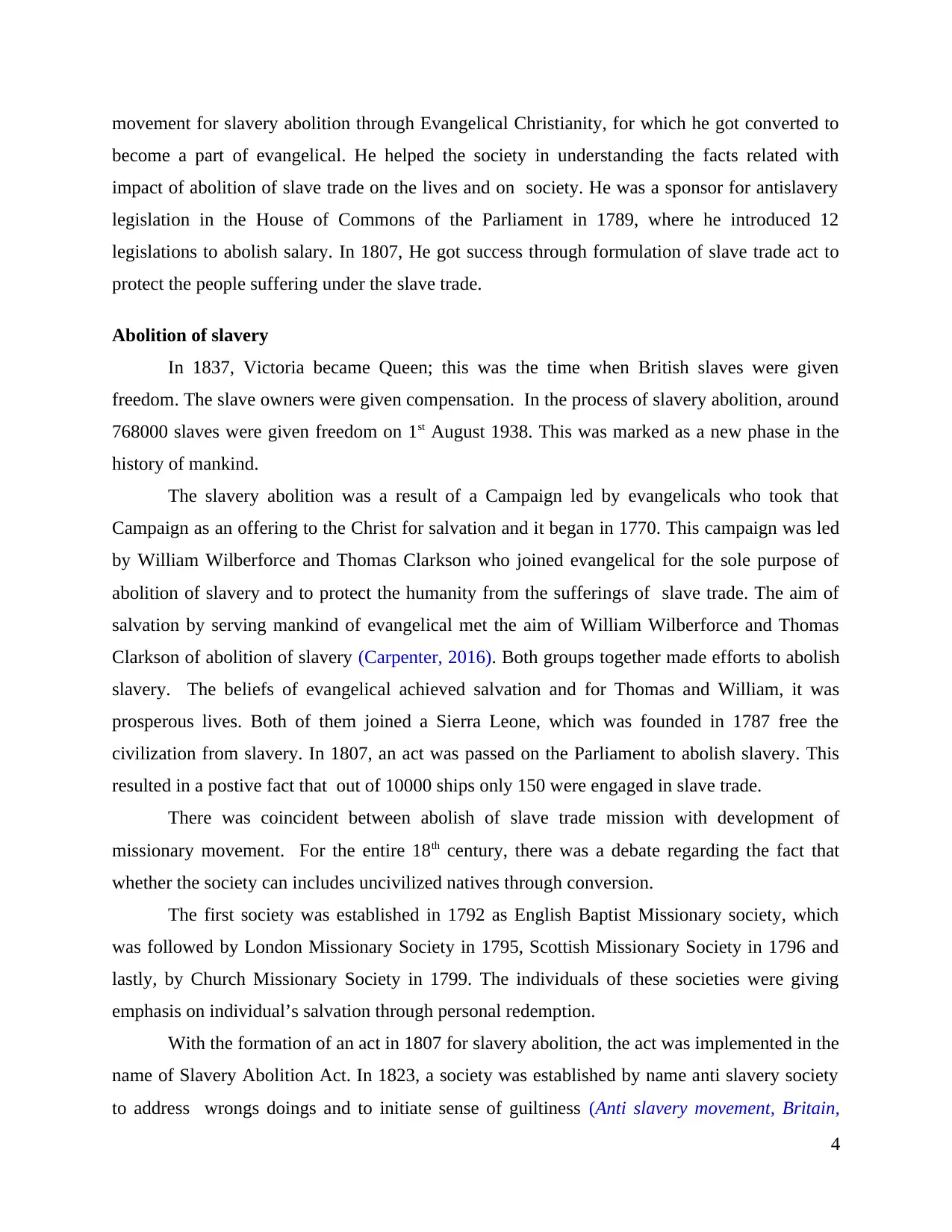
movement for slavery abolition through Evangelical Christianity, for which he got converted to
become a part of evangelical. He helped the society in understanding the facts related with
impact of abolition of slave trade on the lives and on society. He was a sponsor for antislavery
legislation in the House of Commons of the Parliament in 1789, where he introduced 12
legislations to abolish salary. In 1807, He got success through formulation of slave trade act to
protect the people suffering under the slave trade.
Abolition of slavery
In 1837, Victoria became Queen; this was the time when British slaves were given
freedom. The slave owners were given compensation. In the process of slavery abolition, around
768000 slaves were given freedom on 1st August 1938. This was marked as a new phase in the
history of mankind.
The slavery abolition was a result of a Campaign led by evangelicals who took that
Campaign as an offering to the Christ for salvation and it began in 1770. This campaign was led
by William Wilberforce and Thomas Clarkson who joined evangelical for the sole purpose of
abolition of slavery and to protect the humanity from the sufferings of slave trade. The aim of
salvation by serving mankind of evangelical met the aim of William Wilberforce and Thomas
Clarkson of abolition of slavery (Carpenter, 2016). Both groups together made efforts to abolish
slavery. The beliefs of evangelical achieved salvation and for Thomas and William, it was
prosperous lives. Both of them joined a Sierra Leone, which was founded in 1787 free the
civilization from slavery. In 1807, an act was passed on the Parliament to abolish slavery. This
resulted in a postive fact that out of 10000 ships only 150 were engaged in slave trade.
There was coincident between abolish of slave trade mission with development of
missionary movement. For the entire 18th century, there was a debate regarding the fact that
whether the society can includes uncivilized natives through conversion.
The first society was established in 1792 as English Baptist Missionary society, which
was followed by London Missionary Society in 1795, Scottish Missionary Society in 1796 and
lastly, by Church Missionary Society in 1799. The individuals of these societies were giving
emphasis on individual’s salvation through personal redemption.
With the formation of an act in 1807 for slavery abolition, the act was implemented in the
name of Slavery Abolition Act. In 1823, a society was established by name anti slavery society
to address wrongs doings and to initiate sense of guiltiness (Anti slavery movement, Britain,
4
become a part of evangelical. He helped the society in understanding the facts related with
impact of abolition of slave trade on the lives and on society. He was a sponsor for antislavery
legislation in the House of Commons of the Parliament in 1789, where he introduced 12
legislations to abolish salary. In 1807, He got success through formulation of slave trade act to
protect the people suffering under the slave trade.
Abolition of slavery
In 1837, Victoria became Queen; this was the time when British slaves were given
freedom. The slave owners were given compensation. In the process of slavery abolition, around
768000 slaves were given freedom on 1st August 1938. This was marked as a new phase in the
history of mankind.
The slavery abolition was a result of a Campaign led by evangelicals who took that
Campaign as an offering to the Christ for salvation and it began in 1770. This campaign was led
by William Wilberforce and Thomas Clarkson who joined evangelical for the sole purpose of
abolition of slavery and to protect the humanity from the sufferings of slave trade. The aim of
salvation by serving mankind of evangelical met the aim of William Wilberforce and Thomas
Clarkson of abolition of slavery (Carpenter, 2016). Both groups together made efforts to abolish
slavery. The beliefs of evangelical achieved salvation and for Thomas and William, it was
prosperous lives. Both of them joined a Sierra Leone, which was founded in 1787 free the
civilization from slavery. In 1807, an act was passed on the Parliament to abolish slavery. This
resulted in a postive fact that out of 10000 ships only 150 were engaged in slave trade.
There was coincident between abolish of slave trade mission with development of
missionary movement. For the entire 18th century, there was a debate regarding the fact that
whether the society can includes uncivilized natives through conversion.
The first society was established in 1792 as English Baptist Missionary society, which
was followed by London Missionary Society in 1795, Scottish Missionary Society in 1796 and
lastly, by Church Missionary Society in 1799. The individuals of these societies were giving
emphasis on individual’s salvation through personal redemption.
With the formation of an act in 1807 for slavery abolition, the act was implemented in the
name of Slavery Abolition Act. In 1823, a society was established by name anti slavery society
to address wrongs doings and to initiate sense of guiltiness (Anti slavery movement, Britain,
4
⊘ This is a preview!⊘
Do you want full access?
Subscribe today to unlock all pages.

Trusted by 1+ million students worldwide
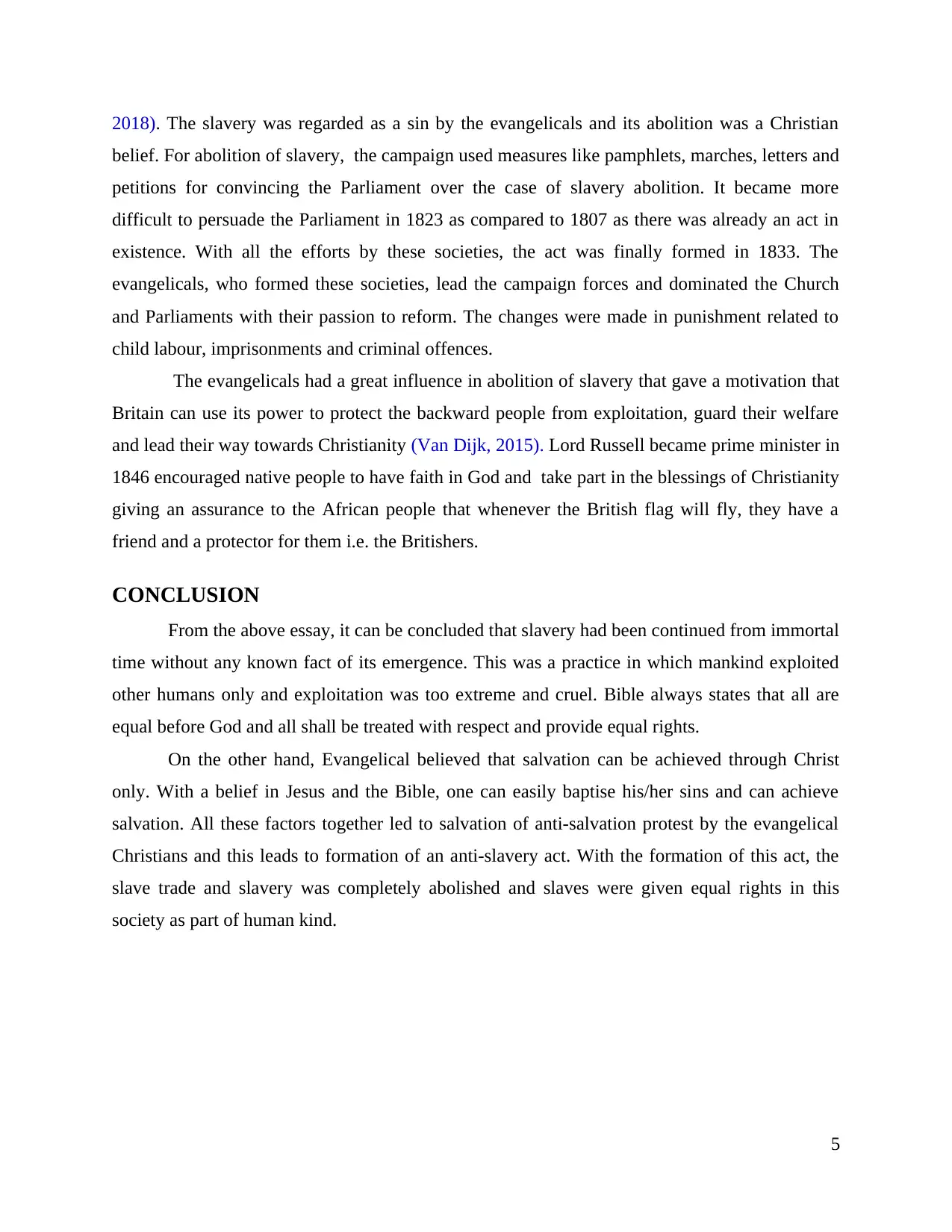
2018). The slavery was regarded as a sin by the evangelicals and its abolition was a Christian
belief. For abolition of slavery, the campaign used measures like pamphlets, marches, letters and
petitions for convincing the Parliament over the case of slavery abolition. It became more
difficult to persuade the Parliament in 1823 as compared to 1807 as there was already an act in
existence. With all the efforts by these societies, the act was finally formed in 1833. The
evangelicals, who formed these societies, lead the campaign forces and dominated the Church
and Parliaments with their passion to reform. The changes were made in punishment related to
child labour, imprisonments and criminal offences.
The evangelicals had a great influence in abolition of slavery that gave a motivation that
Britain can use its power to protect the backward people from exploitation, guard their welfare
and lead their way towards Christianity (Van Dijk, 2015). Lord Russell became prime minister in
1846 encouraged native people to have faith in God and take part in the blessings of Christianity
giving an assurance to the African people that whenever the British flag will fly, they have a
friend and a protector for them i.e. the Britishers.
CONCLUSION
From the above essay, it can be concluded that slavery had been continued from immortal
time without any known fact of its emergence. This was a practice in which mankind exploited
other humans only and exploitation was too extreme and cruel. Bible always states that all are
equal before God and all shall be treated with respect and provide equal rights.
On the other hand, Evangelical believed that salvation can be achieved through Christ
only. With a belief in Jesus and the Bible, one can easily baptise his/her sins and can achieve
salvation. All these factors together led to salvation of anti-salvation protest by the evangelical
Christians and this leads to formation of an anti-slavery act. With the formation of this act, the
slave trade and slavery was completely abolished and slaves were given equal rights in this
society as part of human kind.
5
belief. For abolition of slavery, the campaign used measures like pamphlets, marches, letters and
petitions for convincing the Parliament over the case of slavery abolition. It became more
difficult to persuade the Parliament in 1823 as compared to 1807 as there was already an act in
existence. With all the efforts by these societies, the act was finally formed in 1833. The
evangelicals, who formed these societies, lead the campaign forces and dominated the Church
and Parliaments with their passion to reform. The changes were made in punishment related to
child labour, imprisonments and criminal offences.
The evangelicals had a great influence in abolition of slavery that gave a motivation that
Britain can use its power to protect the backward people from exploitation, guard their welfare
and lead their way towards Christianity (Van Dijk, 2015). Lord Russell became prime minister in
1846 encouraged native people to have faith in God and take part in the blessings of Christianity
giving an assurance to the African people that whenever the British flag will fly, they have a
friend and a protector for them i.e. the Britishers.
CONCLUSION
From the above essay, it can be concluded that slavery had been continued from immortal
time without any known fact of its emergence. This was a practice in which mankind exploited
other humans only and exploitation was too extreme and cruel. Bible always states that all are
equal before God and all shall be treated with respect and provide equal rights.
On the other hand, Evangelical believed that salvation can be achieved through Christ
only. With a belief in Jesus and the Bible, one can easily baptise his/her sins and can achieve
salvation. All these factors together led to salvation of anti-salvation protest by the evangelical
Christians and this leads to formation of an anti-slavery act. With the formation of this act, the
slave trade and slavery was completely abolished and slaves were given equal rights in this
society as part of human kind.
5
Paraphrase This Document
Need a fresh take? Get an instant paraphrase of this document with our AI Paraphraser
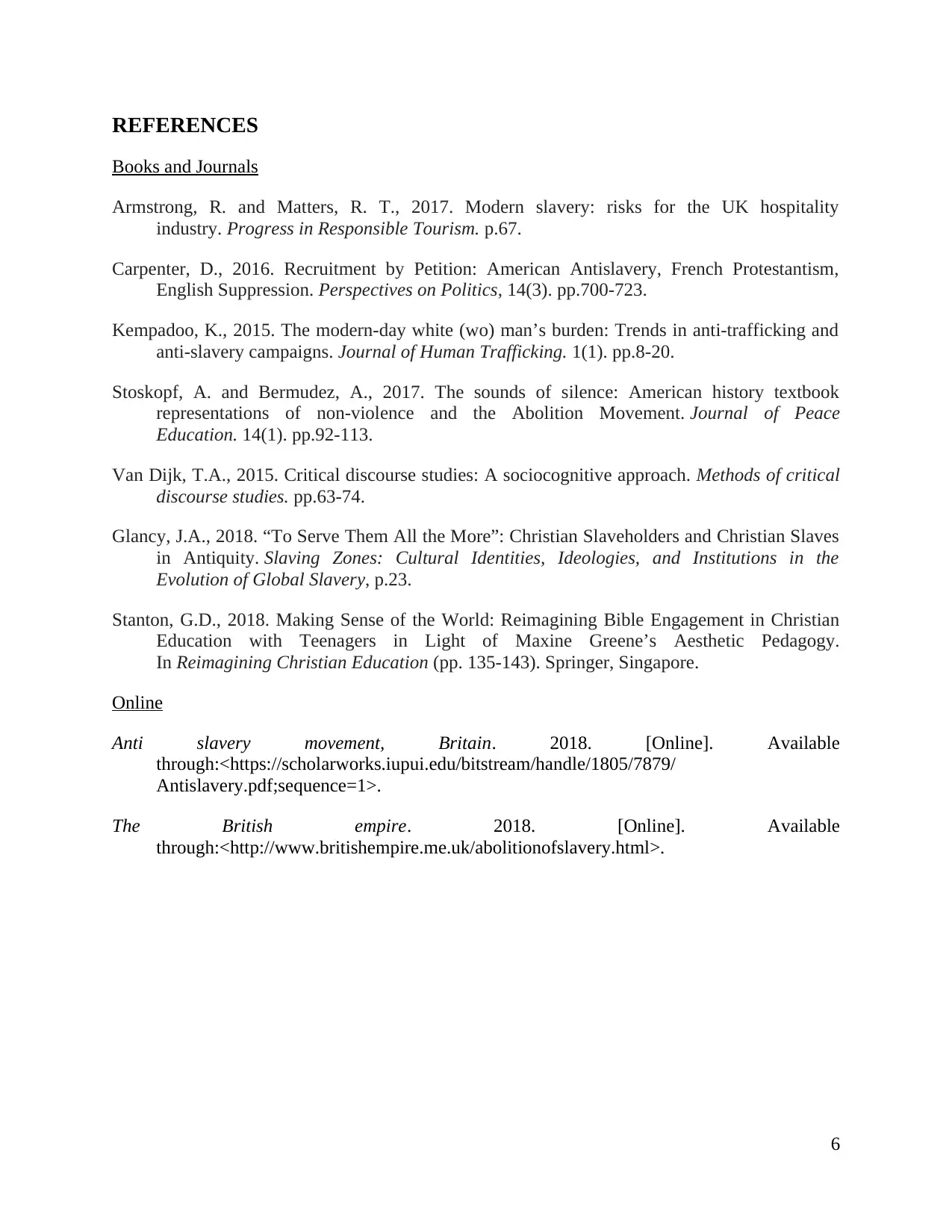
REFERENCES
Books and Journals
Armstrong, R. and Matters, R. T., 2017. Modern slavery: risks for the UK hospitality
industry. Progress in Responsible Tourism. p.67.
Carpenter, D., 2016. Recruitment by Petition: American Antislavery, French Protestantism,
English Suppression. Perspectives on Politics, 14(3). pp.700-723.
Kempadoo, K., 2015. The modern-day white (wo) man’s burden: Trends in anti-trafficking and
anti-slavery campaigns. Journal of Human Trafficking. 1(1). pp.8-20.
Stoskopf, A. and Bermudez, A., 2017. The sounds of silence: American history textbook
representations of non-violence and the Abolition Movement. Journal of Peace
Education. 14(1). pp.92-113.
Van Dijk, T.A., 2015. Critical discourse studies: A sociocognitive approach. Methods of critical
discourse studies. pp.63-74.
Glancy, J.A., 2018. “To Serve Them All the More”: Christian Slaveholders and Christian Slaves
in Antiquity. Slaving Zones: Cultural Identities, Ideologies, and Institutions in the
Evolution of Global Slavery, p.23.
Stanton, G.D., 2018. Making Sense of the World: Reimagining Bible Engagement in Christian
Education with Teenagers in Light of Maxine Greene’s Aesthetic Pedagogy.
In Reimagining Christian Education (pp. 135-143). Springer, Singapore.
Online
Anti slavery movement, Britain. 2018. [Online]. Available
through:<https://scholarworks.iupui.edu/bitstream/handle/1805/7879/
Antislavery.pdf;sequence=1>.
The British empire. 2018. [Online]. Available
through:<http://www.britishempire.me.uk/abolitionofslavery.html>.
6
Books and Journals
Armstrong, R. and Matters, R. T., 2017. Modern slavery: risks for the UK hospitality
industry. Progress in Responsible Tourism. p.67.
Carpenter, D., 2016. Recruitment by Petition: American Antislavery, French Protestantism,
English Suppression. Perspectives on Politics, 14(3). pp.700-723.
Kempadoo, K., 2015. The modern-day white (wo) man’s burden: Trends in anti-trafficking and
anti-slavery campaigns. Journal of Human Trafficking. 1(1). pp.8-20.
Stoskopf, A. and Bermudez, A., 2017. The sounds of silence: American history textbook
representations of non-violence and the Abolition Movement. Journal of Peace
Education. 14(1). pp.92-113.
Van Dijk, T.A., 2015. Critical discourse studies: A sociocognitive approach. Methods of critical
discourse studies. pp.63-74.
Glancy, J.A., 2018. “To Serve Them All the More”: Christian Slaveholders and Christian Slaves
in Antiquity. Slaving Zones: Cultural Identities, Ideologies, and Institutions in the
Evolution of Global Slavery, p.23.
Stanton, G.D., 2018. Making Sense of the World: Reimagining Bible Engagement in Christian
Education with Teenagers in Light of Maxine Greene’s Aesthetic Pedagogy.
In Reimagining Christian Education (pp. 135-143). Springer, Singapore.
Online
Anti slavery movement, Britain. 2018. [Online]. Available
through:<https://scholarworks.iupui.edu/bitstream/handle/1805/7879/
Antislavery.pdf;sequence=1>.
The British empire. 2018. [Online]. Available
through:<http://www.britishempire.me.uk/abolitionofslavery.html>.
6
1 out of 8
Related Documents
Your All-in-One AI-Powered Toolkit for Academic Success.
+13062052269
info@desklib.com
Available 24*7 on WhatsApp / Email
![[object Object]](/_next/static/media/star-bottom.7253800d.svg)
Unlock your academic potential
Copyright © 2020–2026 A2Z Services. All Rights Reserved. Developed and managed by ZUCOL.





